Convictions Under Section 498A Cannot Be Based on Hearsay Evidence: Kerala HC

The court found the allegations against the accused persons very vague and sans details, upholding the acquittal order
The Kerala High Court, affirming the acquittal of three co-accused, emphasised that convictions under Section 498A of the Indian Penal Code (IPC), which addresses cruelty and harassment against women by their husbands or husbands’ relatives, require direct and cogent evidence, ruling out hearsay accounts.
A Division bench comprising Justice Raja Vijayaraghavan V and Justice P.V. Balakrishnan, delivered the verdict while hearing a case stemming from the death of a woman, Girijakumari, who died of poisoning in May 2006, four months after marrying the first accused. The prosecution alleged that the first accused and his family subjected her to physical and mental cruelty, including harassment for dowry. The victim's father and a close relative (PW2) testified that the victim had informed them about her in-laws’ demands for gold and money. The husband’s family reportedly took the victim’s gold ornaments, pledging them to fund the construction of the fourth accused’s house. On the day of the incident, the first accused reportedly gave her a banana laced with poison under the pretext of a mutual suicide pact. However, only the victim consumed it.
In 2014, the trial court convicted the first accused of murder under Section 302 IPC but acquitted all accused, including the first, under Section 498A IPC due to lack of evidence. This decision was appealed by the victim’s father (PW1), challenging only the acquittal of the co-accused under Section 498A IPC.
Referencing the cases of Chandrappa v. State of Karnataka (2007), Tota Singh v. State of Punjab (1987), and State of Rajasthan v. Mohan Lal (2009), the court noted : “It is the law that in an appeal against acquittal, the court would not ordinarily interfere with the trial court's conclusion unless there are compelling reasons to do so inter alia, on account of manifest errors of law or facts resulting in miscarriage of justice. It will not interfere with an order of acquittal lightly or merely because one other view is possible.”
The court, upon meticulous examination of the evidence in the present case, found that the witnesses admitted that their knowledge of the alleged harassment was based entirely on statements made by the victim shortly before her death and they provided no first-hand accounts of cruelty. The court noted that all the information acquired by the witnesses was “purely hearsay” and “very vague” and that the allegations lacked specific details regarding dates, times, or the nature of incidents.
Regarding the testimony of a close relative (PW2) of the deceased, the court specifically stated, “It does not reveal anything about the date or month or the nature of physical or mental harassment allegedly meted out to Girijakumari. Most importantly, it is to be seen that even after acquiring information about such harassment, she has not informed the father of Girijakumari or any authorities and the afore conduct does not satisfy the test of a prudent person’s mind set.”
The court upheld the acquittal order of the trial court finding that it thoroughly evaluated the evidence on record and correctly ruled that the accused were not guilty of the alleged offences.
Consequently, the court dismissed the appeal for having no material to substantiate the allegations against accused Nos. 2 to 4 under Section 498A IPC, and finding it devoid of merit.
Cause Title: Gopinath Pillai v Vijayalakshmi [CRA(V) NO. 14 OF 2019]
Appearance: Advocate Sivan Madathil - for the petitioner; and Advocates Arun, Aiswarya V.S., Varna Manoj - for the respondents.
